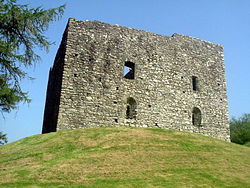William de Wrotham
| William of Wrotham | |
|---|---|
| Archdeacon of Taunton | |

Ruins of Lydford Castle, which was in William's custody
|
|
| Installed | 1204 |
| Term ended | c. 1217 |
| Predecessor | Robert de Geldford |
| Successor | Peter |
| Personal details | |
| Birth name | William |
| Died | c. 1217 |
| Nationality | English |
| Parents | Godwin |
William of Wrotham or William de Wrotham (died c. 1217) was a medieval English royal administrator and clergyman. Although a late 13th-century source says that William held a royal office under King Henry II of England (reigned 1154–1189), the first contemporary reference to William is in 1197, when he became responsible among other things for the royal tin mines. He also held ecclesiastical office, eventually becoming Archdeacon of Taunton, and served King John of England as an administrator of ecclesiastical lands and a collector of taxes.
William's main administrative work was naval. He was in charge of the royal fleet in the south of England in 1205, and was one of those responsible for the development of Portsmouth as a naval dockyard. He continued to be involved in naval matters until 1214 or later, but by 1215 he had joined the First Barons' War against John. After John's death in 1216, William returned to the royalist cause. He probably died in late 1217. Known to a contemporary chronicler as one of John's "evil advisers", William is said by modern historians to have had a "special responsibility for ports, customs, and the navy", and was "keeper of ports", a forerunner of the office of First Lord of the Admiralty.
Little is known of William's background or family, except that his father Godwin held land in Shipbourne, near Wrotham in Kent, perhaps as a vassal of the Archbishops of Canterbury. William's brother Richard was named as William's deputy in 1207.
According to late 13th-century documents, the Hundred Rolls, King Henry II gave William the office of steward of Exmoor, and lands at North Petherton, Somerset. William was the prebend of St Decumans in the cathedral chapter of Bath Cathedral by 9 May 1204. He claimed to have held the office since 1194 during a later dispute with Savaric fitzGeldewin, the Bishop of Bath and another canon of the cathedral, Roger Porretanus, who claimed the prebend. By 23 December 1205, William had secured a papal judgement against Roger.
...
Wikipedia
